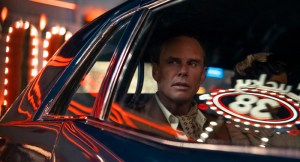Definitive Coen Brothers Movies
In this week's Total Recall, we take a look at the films that helped define the careers of the writing/directing duo behind Hail, Caesar!
For more than two and a half decades now, Joel and Ethan Coen have been thrilling critics — and, here and there, audiences — with their distinctive blend of dark humor, colorful violence, and singular visual flair. Not all of the Coens’ films have been critical darlings (alas, poor Ladykillers), but with lifetime Tomatometers above 80 percent, the brothers are easily two (or is that one?) of the most respected directors in the business. Their latest effort, Hail, Caesar!, hit theaters this week, and to celebrate, we’ve collected their most definitive directorial efforts, Total Recall style!

Combining the shocks of a slasher film with the moral ambiguity and twisty plotting of film noir, the Coens’ debut, Blood Simple, shook American independent cinema to its core. Creepy and deliriously malevolent, it’s the story of a bar owner who hires a sketchy private eye to kill his cheating wife (Frances McDormand); double and triple crosses and bloody mayhem ensues. With their first film, the Coens showed an aptitude for the stylistic quirks that would become their trademark — namely, a love of the ghoulish balanced with a loopy sense of humor. The Palo Alto Weekly’s Jeanne Aufmuth identified what would become recurring themes in their work when she wrote, “The Coens’ complicated sense of the surreal is consistently entertaining, down to the fleeting, oddball cameos and distinctly weird scripting.”

The first Coen brothers film to display their knack for quirky comedy, Raising Arizona helped seal the filmmakers’ reputation and cement their loyal following. Nicolas Cage and Holly Hunter are brilliantly cast as a cop and ex-con husband/wife duo who resolve their infertility with kidnapping. Though not their biggest hit, it’s infinitely quotable (“Edwina’s insides were a rocky place where my seed could find no purchase”), and the original score by Carter Burwell is not to be ignored. As the New Times’ Luke Y. Thompson ruefully sighed, “Nic Cage may never be better.”

As an homage to classic gangster movies, Miller’s Crossing is hypercharged; the language is harsher, the violence more brutal, the plotting more labyrinthine. Albert Finney and Gabriel Byrne star as Irish mobsters, threatened externally by the Italian mob and internally by their shared love of a woman (Marcia Gay Harden). This intriguing tale of loyalty features impeccable 1920s decor and a streak of dark humor; it’s arguably the Coens’ most straightforward work. Combustible Celluloid’s Jeffrey M. Anderson concluded, “it’s one of their best, most cohesive films and it holds up to repeated viewings.”

Legend has it the Coens had such a bad case of writers’ block while writing Miller’s Crossing that they took three weeks off to script Barton Fink, a 1930s-set black comedy about — what else? — a Hollywood scribe with writer’s block. A fledgling New York playwright who sells out (at the cost of… his soul!) and moves to the City of Angels, Barton Fink (played marvelously by Coen regular John Turturro) holes up in the seamy Hotel Earle, where exquisitely dismal wallpaper peels off the walls as a heat wave sweats the city. The mercury rises further when Barton’s gregarious neighbor (John Goodman) is around; almost hellishly so, you might say. But as every smart filmmaker is wont to do, the Coens offer no overt explanations of what’s really going on — just a well-told tale with visual imagery aplenty, and an ode to the sometimes infernal nature of the creative process. Describing it as “gnomic, claustrophobic, hallucinatory, just plain weird,” Time’s Richard Schickel lauded Barton Fink as “the kind of movie critics can soak up thousands of words analyzing and cinephiles can soak up at least three espressos arguing their way through.”

Prior to No Country For Old Men, the macabre, pitch-black comedy Fargo was the Coens’ most decorated film, with seven Oscar nominations and two wins: Best Actress (Frances McDormand) and Best Original Screenplay. Fargo details a ransom kidnap scheme gone wrong, with very pregnant cop McDormand investigating the crime as the bumbling perpetrators attempt to cover their tracks. The Coens’ bleak humor and taste for blood and violence never mixed as well as it did in Minnesota, so the people over at FX decided to create an offshoot television series — with the Coens on board as executvie producers — and it’s gone on to win some awards of its own. According to Kevin N. Laforest of the Montreal Film Journal, “This is truly a brilliant film, the kind you don’t see often. Intelligent, raw, funny, daring and unique, pure cinematic delight from start to end.”

Though many of the Coens’ films can be labeled cult classics, perhaps none embody the term more than The Big Lebowski. Jeff Bridges stars as pot-smoking slacker hero Jeffrey “The Dude” Lebowski, who seeks restitution for his rug, urinated on by a pair of gangsters who mistook him for a different Lebowski — namely, the “big” one (played by David Huddleston). Along with his bowling buddies, The Dude embarks on a wild chase that’s as funny, depraved, and plain unpredictable as Los Angeles always feels like it should be. Not all critics were willing to join The Dude’s steadily growing cult — Todd McCarthy of Variety sniffed that the movie “Adds up to considerably less than the sum of its often scintillating parts” — but in the end, as Chuck O’Leary of FulvueDrive-in.com wrote, “It’s pretty much impossible not to love The Dude.”

With O Brother, Where Art Thou?, the Coen brothers took their thriller tropes (ill-fated criminal plans, ironic stereotypes, and a detached tone) and magically applied it towards an Odyssey-inspired farce. Starring George Clooney as the beleaguered but resourceful Odysseus, O Brother is a sepia-toned fantasia of throwaway jokes, slapstick, and killer bluegrass. In fact, the music proved popular enough to spawn a virtual cottage industry with multiple soundtracks, a documentary, and even a national tour. “The surprise is how much fruitful digression such plotlessness makes possible,” quipped Geoff Pevere of the Toronto Star. “With no particular place to go, this hobo of a movie is free to roam the damnedest places.”

Though the Coens have long been revered for their intermittently manic and macabre storylines, they’ve never made Oscar bait. It’s perhaps logical, then, that the massive Academy sweep they enjoyed with No Country for Old Men seemed like overdue praise. In No Country, based on the stoic anti-western novel by Cormack McCarthy, Josh Brolin’s protagonist sees a way out of his trailer in a bag of bloodied bills. Chance and destiny are invoked in the most resonant, least pretentious way in the sinister form of Anton Chigurh (Best Supporting Actor Javier Bardem), the hit man who coldly and relentlessly hunts Brolin’s Llewelyn. No Country is impeccable: the cinematography is breathtaking, the dialogue efficient, and the direction assured. Yet instead of the terse comic punch we’ve come to expect from the Coens, No Country takes a more dangerous tack with its morbid themes. With all the cards (and coins) falling tidily into place, this film presented the brothers as a truly mature filmmaking team, possibly at the peak of their careers — a sentiment echoed by Peter Keough of the Boston Phoenix, who proclaimed, “No Country for Old Men is the brothers at their most polished, austere, and humorless.”

It takes some major stones to step into John Wayne’s boots for a remake of one of the Duke’s classic pictures, so even if the Coen brothers’ True Grit had well and truly stunk, we’d have to give their version credit for having something extra in its saddlebag — namely Jeff Bridges, who took the role of the cantankerous Rooster Cogburn and made it his own. Of course, it didn’t hurt that Bridges (in vintage late-period marble-mouthed form) was surrounded by an ace supporting cast that included Matt Damon and Hailee Steinfeld, or that the Coens went back to Charles Portis’ original novel for inspiration; in the end, the result was a career-launching hit for Steinfeld, a mainstream hit for the Coens, and another critically acclaimed outing for Bridges — all of whom earned Oscar nominations for their work. As Claudia Puig observed for USA Today, “Joel and Ethan Coen have pulled off an impressive feat: repurposing a classic film with their idiosyncratic blend of dark, deadpan humor and palpable suspense, while remaining ultra-faithful to the novel.”

A brilliantly cast ensemble period drama shot through with pitch-black, borderline misanthropic humor and topped off with a killer soundtrack, Inside Llewyn Davis checks off any number of the boxes filmgoers have learned to associate with the Coen brothers, so it’s very much to the film’s credit that it somehow manages to feel fresh anyway. This is due in no small part to the work of Oscar Isaac, who plays the titular struggling folk musician with an utter lack of vanity while infusing the character with enough essential humanity to temper his overall lack of likability — and to the Coens’ screenplay, which serves as a savagely honest, yet ultimately affectionate, look at the self-delusional struggle for artistic purity as a means to its own end. “It may be the Coen Brothers playing well inside their comfort zone,” wrote Scott Mendelson for Forbes, “but what a fine and thoughtful comfort zone it is.”







